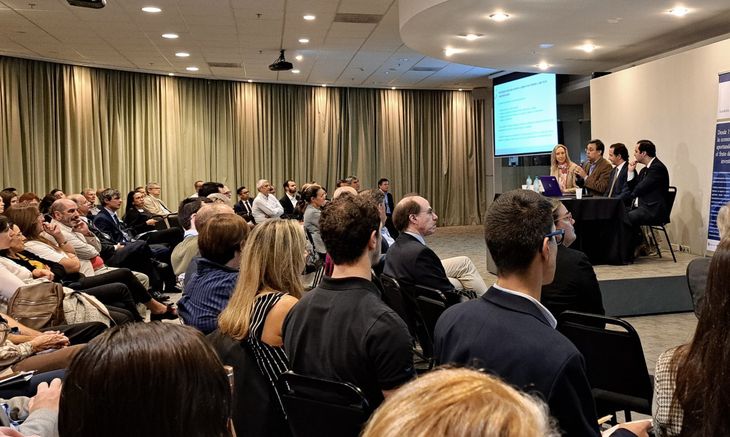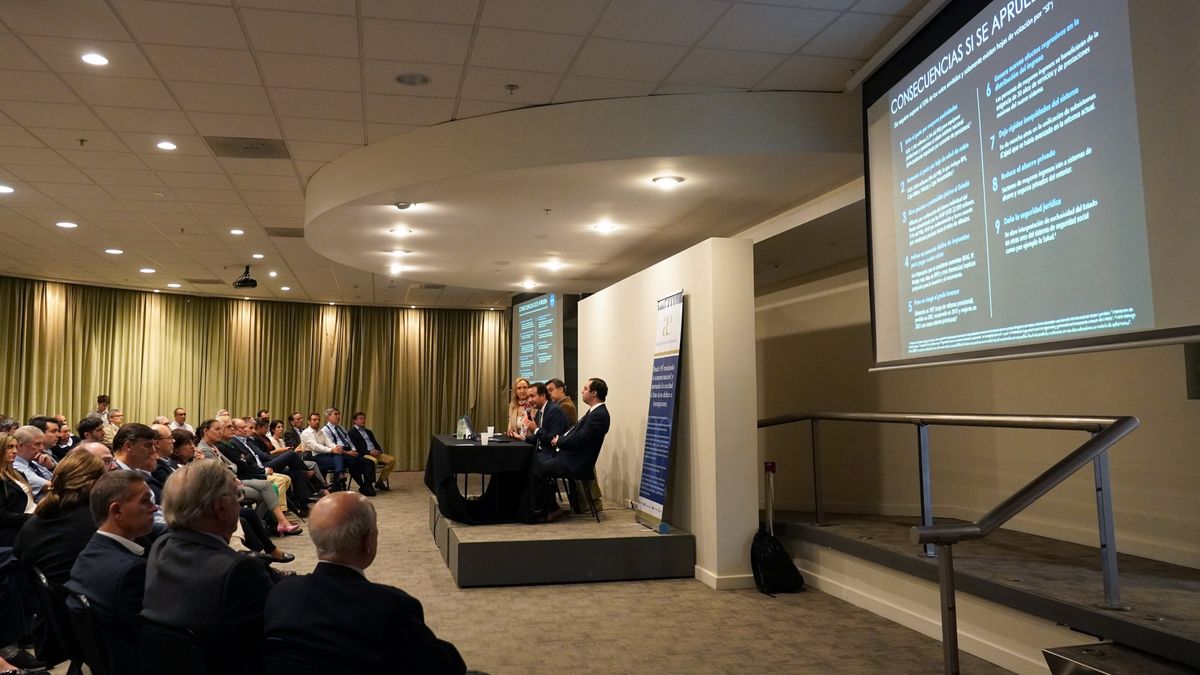The National Academy of Economics called four prominent professionals this Tuesday to present their arguments against the campaign to collect signatures that would enable a plebiscite against social security reform in Uruguay, initiative promoted by PIT-CNT. The arguments, ranging from macroeconomic issues to the country’s international reputation, were shared by the main leaders of the business chambers.
At the beginning of the interventions centered on the activity “The proposal for provisional reform of the PIT-CNT: What is at stake?”, the economist of the Center for Development Studies (CED) Hernán Bonilla argued that “in Uruguay, Fortunately, populism does not enter through political parties or our presidential candidates, but we have a pension reform proposal that is indeed a true populist bomb”.
In that sense, he pointed out that the constitutional reform sought by the union center “is a very dangerous proposal for the country.” Among the arguments mentioned, “because it seriously affects the sustainability of the social security system, seriously compromises the Public finances going forward, it does great damage to the change in the rules of the game in the country and to the stability of the rules of the game, which is one of the important assets that the country has,” stated Bonilla.
PIT-CNT plebiscite panel 4.jpeg
The economists Hernán Bonilla, Bárbara Mainzer, Gustavo Zunino and Ignacio Munyo spoke about the risks of a constitutional reform in pension matters in Uruguay.
The importance of stability and clear rules
In turn, the economist from the National Academy of Economics Barbara Mainzer executive director of the Association of Private Banks of Uruguay (APBU), agreed that “we should not put at risk the stability and respect for the rules of the game that characterizes us so much, that was built over time, that is such a precious treasure and that we have to take care of.” For the specialist, the proposal of the PIT-CNT “It is an event of such high impact that we have the obligation to attend to it, because if this goes ahead it is a very, very big problem. And part of the problem we have is that it is something very complex. This requires a intertemporal look. “They are extremely complex topics to understand,” he said.
Mainzer also made reference to the internal union movement when taking a position on the collection of signatures. “While this was being discussed within the PIT-CNT, the banking union AEBU distributed a statement that I believe is one of the strongest defenses or the strongest arguments against this project. And, among others, he spoke of the impacts on rightslimitations on social protection in some sectors, which affects equity and justice, increases the success of the entire system without promoting sources of financing and mentioned possible trials”, said the economist.
For his part, the director of Center for Economic Research (Cinve), Gonzalo Zuninoused graphs and numerical comparisons stating that “today the deficit “We would be talking about basically 8 points by 2050 and 12 points by 2100 in case the plebiscite succeeds. This has a very great sensitivity to interest rate to which we bring it and also some technical problems, that is at least worth 40 points of the product. And well, depending on the interest rate scenario that we consider, this increase in the deficit can go up to almost 95 points of the product, almost an entire GDP. There is no possible reform that contains spending, that solves sustainability issues and does not affect the generosity of benefits. So whenever we are faced with a reform and whoever promotes the reform says here no one loses, or here no one comes out worse than with the previous regime, be suspicious,” he assured.
Finally, the director of Center for Studies of Economic and Social Reality (Ceres), Ignacio Munyowho has become one of the strongest voices against the social security initiative, expressed that “the package has two tremendously popular legs and one unpopular leg, but it has been a historic battle since its creation in 1995.” 96 of the system of the AFAP to the relevant increase in the population of the Uruguay that is philosophically against, it is difficult to find logical and rational arguments that transcend the ideological component that is always present.”
Regarding political support for the campaign, Munyo considered that “no party is probably going to embed the ballot that needs to reach 50% plus one of the votes in the election, but it will be available and we have to see how all this information is processed.” throughout the campaign.
The director of Ceres used as a reference the experience promoted by the government of Cristina Fernández de Kirchner in Argentina: “Let’s look at the Argentine example, what happened? She automatically lowered her sovereign risk rating from B to B- the next day, and increased the country risk by 520 basis points in two days. In Argentina there are already very high levels, because we also have to understand that they were in a process of advancing on many fronts and also a financial need,” he contextualized.
Finally, Munyo concluded that “there is a global ranking of pensions that in 2003 included more than 50 indicators that take into account the sufficiency, sustainability and integrity of pension systems. The number one in the world is Holland. Because? Because it managed to solve the sustainability problem by allowing its workers to invest a part of their contributions in private investment funds and guaranteed a minimum retirement, a component of the Uruguayan system that was modified by the two reforms, the last one last year. Uruguay It is fifteenth in the world, we have a system that is fifteenth, and we want to be similar with this reform to the last one, the one that is worst in the ranking, which is the Argentine system.”
PIT-CNT plebiscite panel 2.jpeg

The sustainability of the pension system, the increase in tax pressure and the loss of credibility were the risks mentioned for Uruguay.
Coincidence in business chambers
Representatives of the main business chambers were also present at the activity carried out by the National Academy of Economics.
The president of the Chamber of Commerce and Services of Uruguay (CCSUy) Julio César Lestido, commented in dialogue with Ambit that this discussion, “more than a technical issue, it is a issue ideological, because it is not only repealing this but also repealing the 1996 reform, which for us is a direct attack on the AFAP.” “We understand that if approved, it would generate enormous problems for the country. But I also go to the individual issue, why can’t I save? Someone explain to me why I can’t have the individual savings, opt for my individual savings, for my retirement. So far I haven’t found it. No one has told us, look, you can’t do this. But they prohibit it. The referendum prohibits voluntary savings,” said Lestido.
“Could we endure, a VAT 30-odd percent? Could we double the contributions of both employers and workers? Does it support Uruguay a tax burden more than we already have? Those are the questions we have to ask,” she added.
For his part, the president of the Confederation of Business Chambers Diego O’Neill considered that “it is a very bad thing to make these types of modifications through the Constitution”. “The world of work varies permanently, the challenges are permanently new, so freezing in the Constitution a retirement age and a series of things in the pension system seems to us to be a very bad idea. Furthermore, it seems to us that it is not fair to set 60 years old and leave it immovable in the Constitution precisely. We are going to burden our children, our grandchildren with many taxes, because sustaining the system in the future is going to imply. increase taxes and have many more burdens on future generations,” considered the businessman.
Source: Ambito




